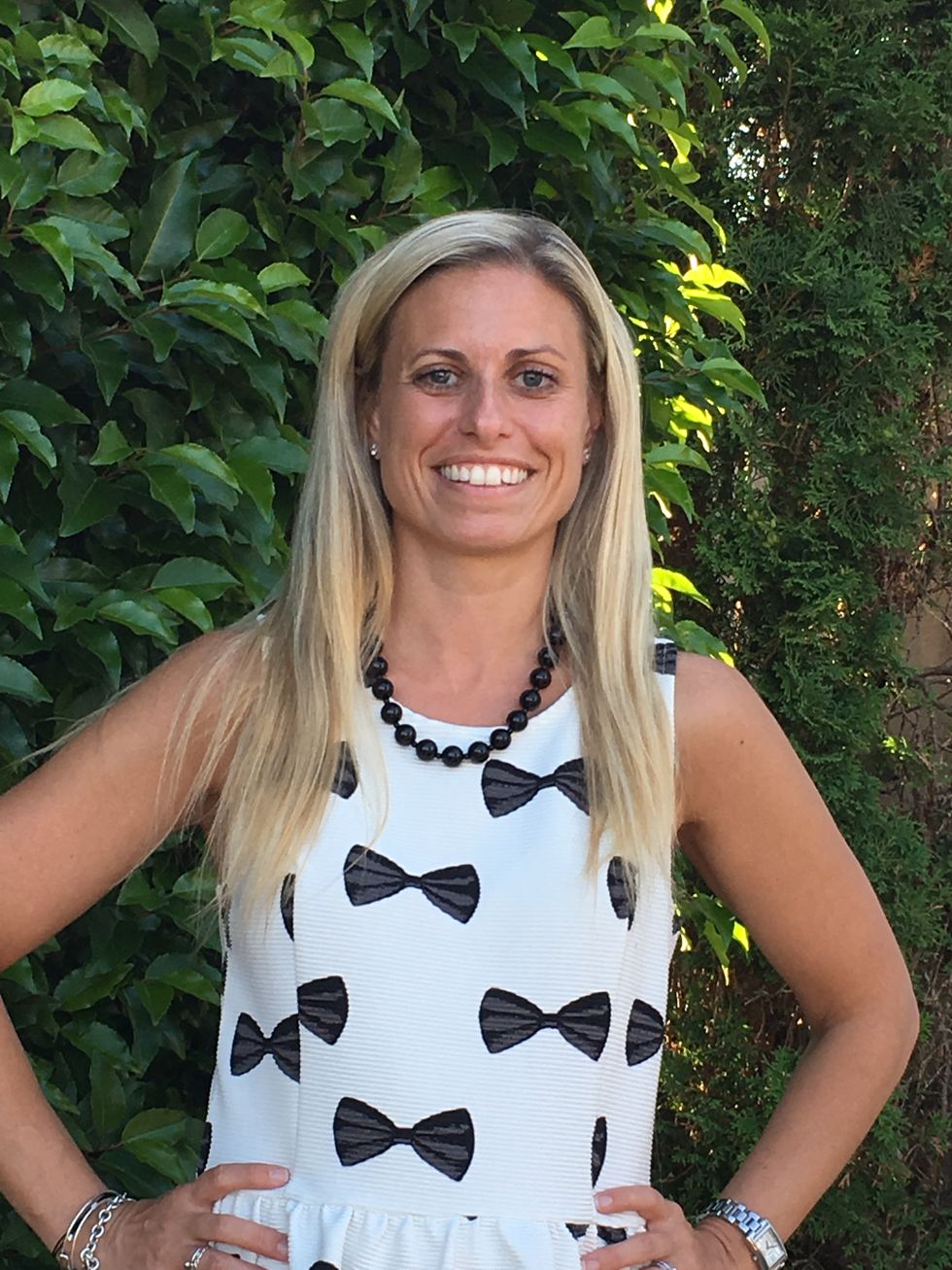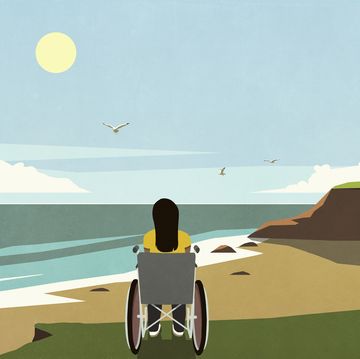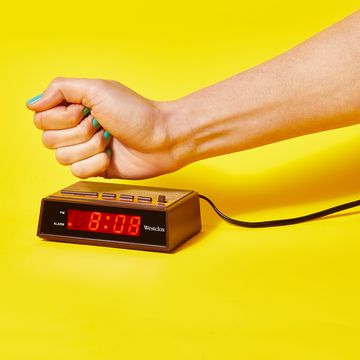It started as innocently as it does for millions of other college students: The summer before her junior year, Brandi Monnier decided she needed to lose the so-called "freshman 15" she had gained after two years of partying.
Trying to lose fiv to 10 pounds didn't seem like a big deal to Monnier, now 38. She planned to follow a few simple dieting rules and get back to the thin-but-healthy body she'd had most of her life.
"I thought to myself: 'I'm going to eat clean, only fruits and vegetables,'" she says. "Everything was fat-free [and] sugar-free."
But over the course of that summer, she went from eating a variety of healthy foods to a single apple a day. She lost 30 pounds in three months and weighed in at a mere 80 pounds. For her 5-foot frame, that was 15 pounds under what's considered a "normal" body mass index.
"When you look in the mirror, you don't think you look as thin as you do in real life." she says. "Nothing is good enough."
At first, her coworkers at Nordstrom complimented her on how well her clothes fit. But over time she became so gaunt that they asked her if she had cancer.
When her sorority told her she couldn't come back until she got help, Monnier checked into a Seattle hospital for two weeks.
Monnier was struggling with orthorexia, an eating disorder that takes "clean eating" to an obsessive and dangerous extreme.
"Sometimes [orthorexia is] limiting the diet to certain foods or a small amount of food, or sometimes it's about the timing of the eating," says Ovidio Bermudez, MD, chief clinical officer of the Eating Recovery Center in Denver. "Some people with orthorexia might avoid all fat, meat, carbs, gluten, or dairy. It can lead to too much weight loss and nutritional deficiencies."
Brideorexia: The Dangerous Way to Fit Into a Wedding Dress
Following her treatment in Seattle, Monnier was doing well. But recovering from an eating disorder is an ongoing process, and triggers are everywhere: While planning her wedding at 24, Monnier became obsessed with fitting into her dress and all the expectations that come with being a beautiful bride.
"I wanted to look perfect, even though it was unattainable," Monnier remembers. "It was all about that one day."
Her eating habits weren't as extreme as they had been in college, but she was still very picky about what she ate, took diet pills, and ran five miles a day.
Known as "brideorexia," this mentality often stems from something deeper than a dress size, Dr. Bermudez explains.
"This is when the prep for the wedding becomes prioritized and the woman has to get to a weight that she sets for herself," Bermudez says. "Some women move toward binging or purging, for instance, as a way of coping with the stress."
Pregorexia: When Losing Baby Weight Takes an Extreme Turn
During her first pregnancy at age 28, Monnier tried to eat normally because she was worried about her daughter's health.
"But as soon as she was born, all I wanted to do was get her in a stroller so we could go for a walk," she says. She desperately wanted to focus on her beautiful newborn, but all she could think about was her body. "I crashed that weight and almost ended up in a hospital again."
Known as "pregorexia," this type of disordered eating and behavior takes place either during pregnancy or right after a baby is born. These actions can have negative effects on both the mother as well as the developing fetus.
A similar pattern emerged four years later following the birth of Monnier's son. By the time he was 10 months old, her family was so concerned that she left Seattle to go to the Eating Recovery Center in Denver for three months.
The treatment helped, but only temporarily. Three months after the treatment program ended, her husband asked for a divorce. Monnier was so distraught that she began cutting herself and even considered suicide. So she returned to the center for another three-month stay.
"This time, I was focused, because I knew that if I didn't get better, I would lose custody of my kids," she says. "It was hard and long, but I got better."
Her doctors experimented with different medications until they found a few that worked well together. She was encouraged to eat and talk about her struggles with a support group, a private therapist, and a dietitian.
How to Recognize an Eating Disorder and Ask for Help
Bermudez says that he's seeing a rise in conditions like orthorexia, brideorexia, and pregorexia at his center. But are they considered "real" eating disorders? It depends. They're not recognized as clinical diagnoses in the DSM-5, but groups like the National Eating Disorder Association do acknowledge that many people experience symptoms that are consistent with the disorders and that recovery often requires professional help. And while some women dabble in these behaviors for a short period of time without causing lasting harm, others – like Monnier – may be more genetically vulnerable to disordered eating, Bermudez adds.
A diagnosis of an eating disorder depends on many factors, including what the specific behaviors are, how frequently the person is doing them, how mild or severe the behaviors are, and how they're affecting the person mentally and physically.
If you suspect you might be exhibiting signs of an eating disorder, Bermudez recommends telling your primary care physician and asking where and how to get an assessment. You can also call the National Eating Disorders Association helpline toll-free at 1-800-931-2237 or chat with a volunteer online at nationaleatingdisorders.org.
The most important thing: If you do decide to get an assessment, don't hold back or downplay what's been happening.
"When it comes to some medical issues, like headaches, we tend to tell doctors about every single headache we've ever had," Bermudez says. "But with eating disorders, sometimes we only put a card or two on the table rather than the whole deck. Don't present partial facts."
Recovery: "I Never Thought I'd Get to This Point"
Monnier has been in recovery for the past 4.5 years. She has a great job and is happily remarried.
"I feel amazing, like a different person, like I'm free. I'm finally living life," she says. "I'm not worried about everything I put in my mouth. I'll eat ice cream with the kids and fast food once in a while. I love pizza now and I can enjoy it. I can go out to lunch with people at work. I used to have a hard time eating in front of my family. I never thought I'd get to this point."
And it's not just about the food: "I'm here now and experiencing every moment," she says. "I'm not going through the motions."
Monnier encourages anyone who is struggling to ask for help as soon as possible.
"Some people think the solution is as simple as: 'Just go eat.' But it was so much more than that — it's a mental disorder," she says. "Inside, I was dying for help. Instead of pretending everything was ok and being defiant, I wish I had the courage to ask for help."
For additional information about the Eating Recovery Center, call 877-789-5758, email info@eatingrecoverycenter.com, or visit www.eatingrecoverycenter.com to speak with a Masters-level clinician.














